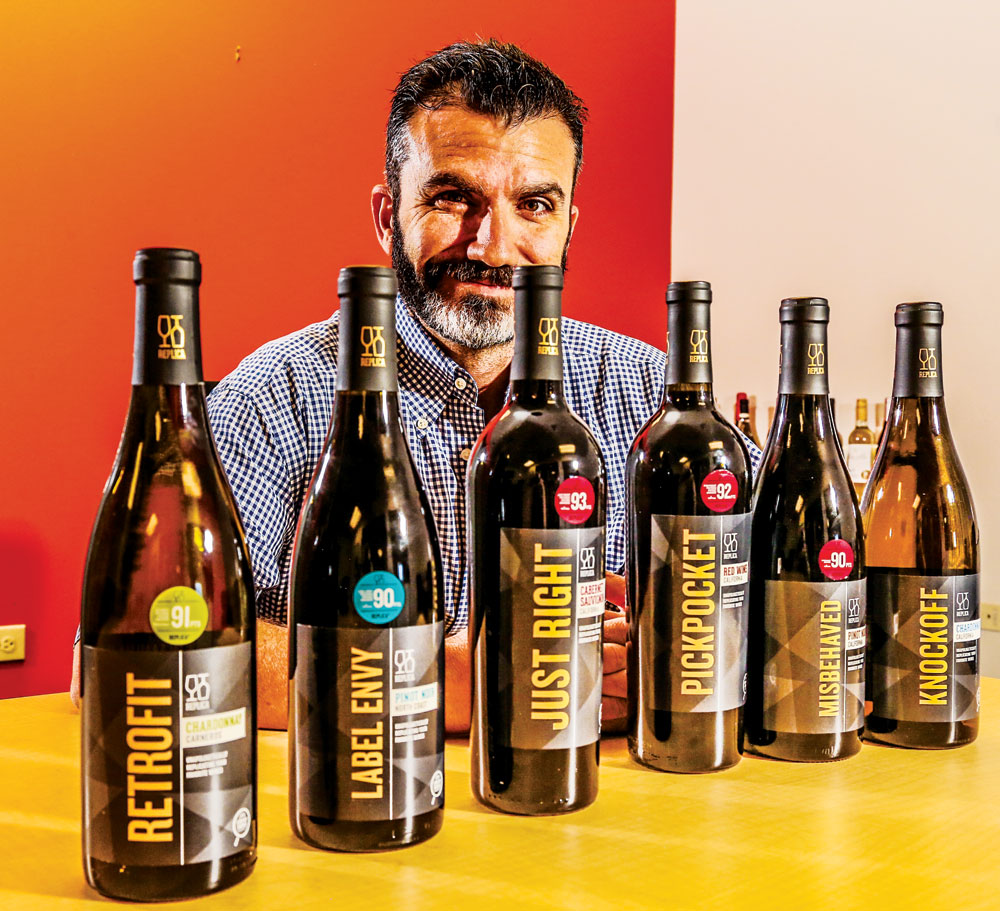
Replica CEO Ari Walker and his partner Kevin Hicks came up with the idea of chemically analyzing the qualities of respected wines and then producing Replica wine with the same qualities at a lower price.
With self-deprecating names like “Pickpocket,” “Knockoff,” and “Label Envy,” Integrated Beverage Group’s Replica wines wink at consumers who seek both good taste and value in a bottle. The brand pairs high-quality grapes with science to create affordable knockoffs of pricey wines. Replica CEO and 13-year Stapleton resident Ari Walker believes that “Consumers are paying more than they should for their favorite wines.” Replica offers wine enthusiasts on a budget some worthy alternatives, and the brand has garnered a lot of national attention recently with features from Wired to CBS News.
Walker and his business partner, Kevin Hicks, found inspiration for a new wine label in part as a consequence of their interest in baby food. They had opened Ellipse Analytics laboratory in north Denver in 2012 hoping to determine what was the best commercial baby food in anticipation of Hicks’ first child. Analysis of many products found disturbing levels of heavy metals and other contaminants. Even organic brands fell short on the purity spectrum, according to Walker, who explains that products are not tested at the end point of production; therefore, contaminants and chemicals may well still appear, even in products made with certified organic ingredients.
Walker and Hicks decided to apply this same technology to wine, reasoning that a careful chemical analysis of well-respected wines could allow them to reverse engineer a good product. They launched Replica in 2016, and the brand now includes nine wines, most of which have garnered a score of 90 or higher from Wine Enthusiast. Replica wines retail for about $15-$20 a bottle compared to the typical $40-$50 price tag on the sources of their inspiration.
The laboratory, which Hicks oversees, has conducted chemical analysis of thousands of wines, building up a database of profiles that include not only taste and aroma but also purity. Ellipse tests for pesticides, metals, antibiotics, and other elements that may originate in agricultural runoff, for example. Walker states that the Replica wines are not only nearly identical to the wines they imitate but “cleaner” as well.
Though wine engineered in a lab may not appeal to some, good grapes remain the key ingredient. IBG owns vineyards in Oregon—and Walker and his team work with farmers in Oregon and California to ensure that they are acquiring the best grapes for their wines. The laboratory provides a chemical profile that the winemakers try to match as closely as possible while making stylistic decisions and incorporating sensory analysis to develop the final product. Among the staff at Integrated Beverage is a certified Master Sommelier (one of fewer than 250 worldwide), who ensures that the wines taste good and are convincing replicas of popular wines.
Though Replica copies great wines, Walker notes that the final product “is also uniquely ours.” He says “Science is a roadmap for our incredible wine-making team.”
For skeptics and book clubs alike, Walker encourages an evening of wine sampling. Compare, for example, Prisoner Red Blend with Replica’s Pickpocket, or Kendall Jackson Vintner’s Reserve Chardonnay with Knockoff and decide for yourself whether it is real or a Replica. For more information visit ReplicaWine.com




0 Comments